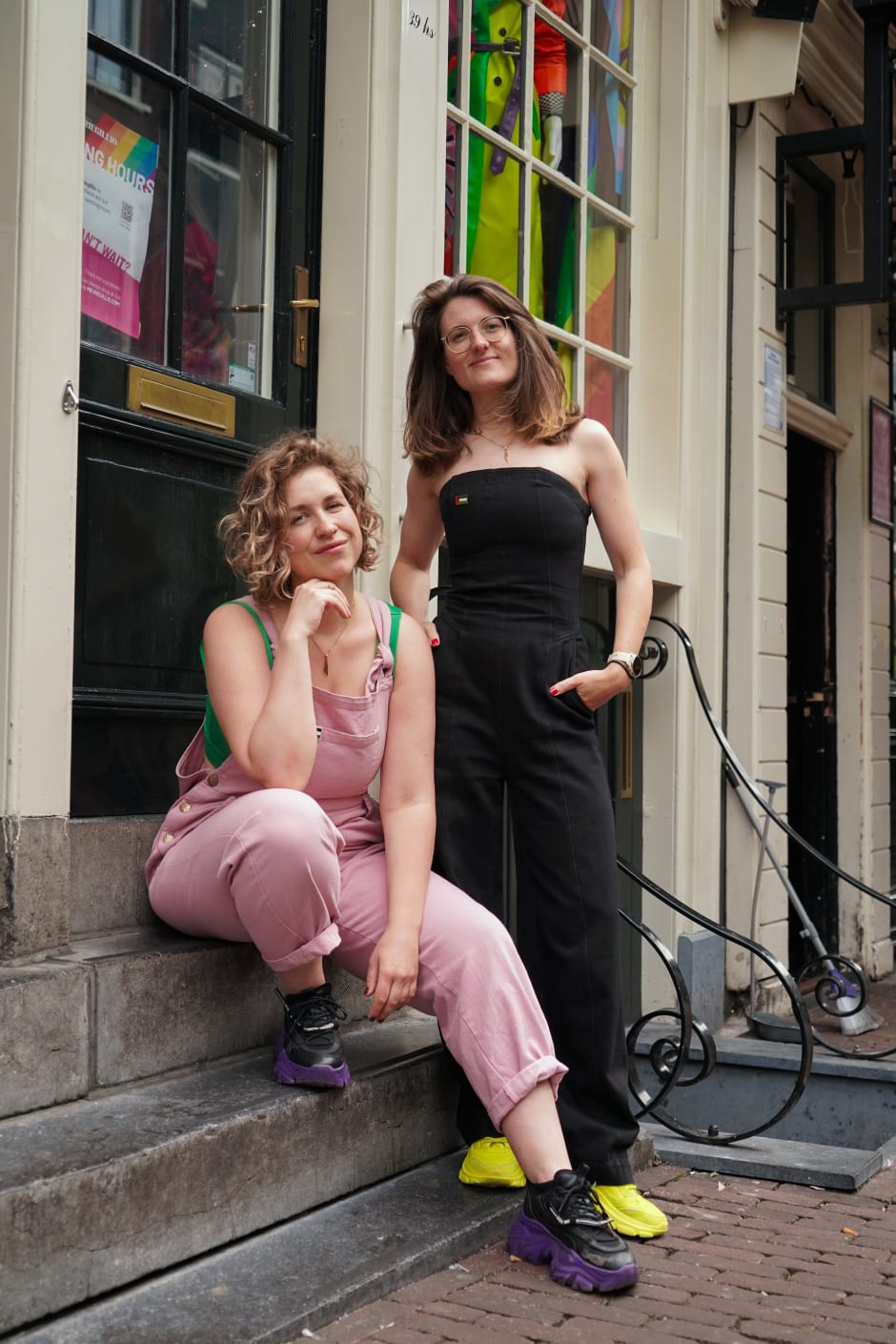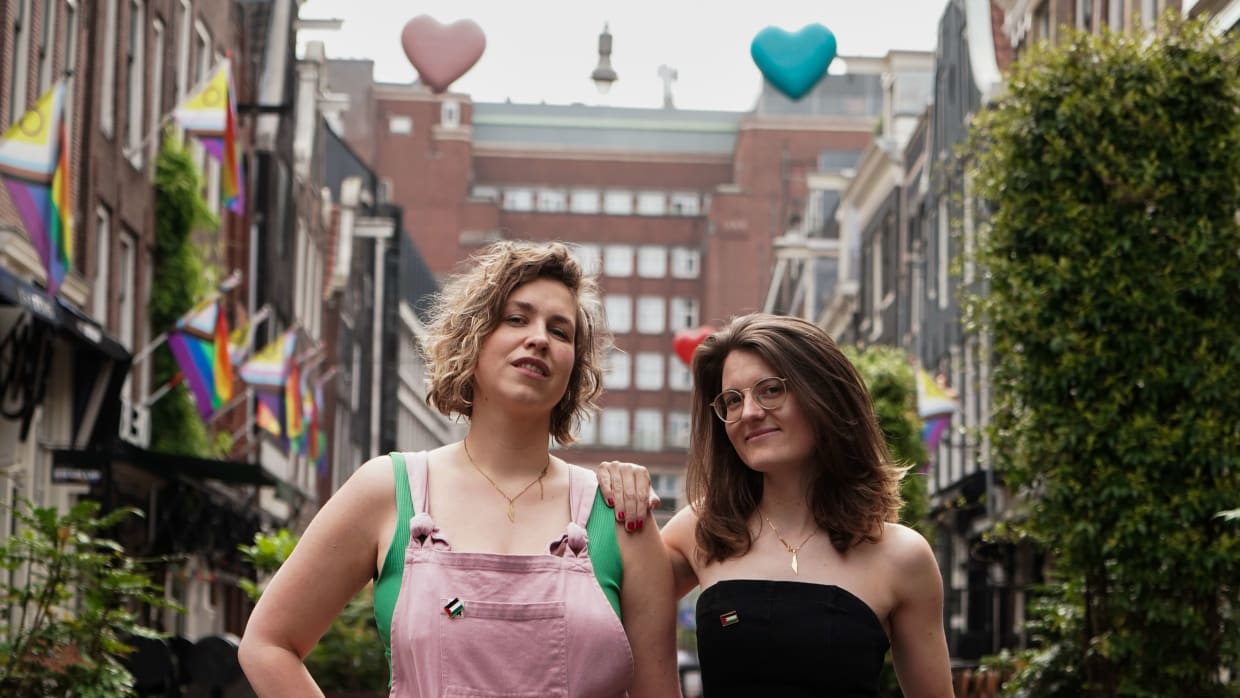
All the ‘shit’ women have to deal with: Damn Honey on the orgasm gap, catcalling and medical sexism
For six years, Nydia van Voorthuizen and Marie Lotte Hagen have been discussing ‘all the shit women of our time have to deal with’ in the feminist podcast Damn Honey. The two girls, who by their own admission ‘didn’t know anything’, grew into feminists and activists who do not hesitate to go to the barricades.
It started as a reaction to a female vlogger’s book that topped the bestseller lists for weeks in 2018. That book, Sexy, but tired, but sexy, with 1950s precepts on how women should behave, so angered recently graduated UvA housemates Nydia van Voorthuizen and Marie Lotte Hagen that they spent a week at the kitchen table writing a pamphlet continuously: Damn Honey. “We wanted to put out a counter voice, without rules you have to meet as a woman, but with the message: you are already good enough the way you are.”
Meanwhile, feminist platform Damn Honey has been Nydia and Marie Lotte’s full-time job for six years. In the eponymous podcast, they not only discuss their own experiences with feminism - such as being yelled at on the street, transgressive behavior and issues with the beauty ideal - on a weekly basis, but also invite guests and discuss listener questions.

You call yourselves a ‘feminist platform about all the shit you have to deal with as a woman of our time’. Give an example of shit that irritates you to no end.
Marie Lotte: “Yes, do you have a minute? We have been at this for six years for a reason, and we are also learning more and more. Talking about big things, we worry about sexual violence, partner violence but also the wage gap: it’s really not ok that men still earn more money than women for the same work.”
Nydia: “Medical sexism, a lot of research has been done on the white cisman (man who was born male and feels like a man, ed.), so the percentage of misunderstood symptoms is much higher in women. But what we think is important is that you can also speak out about the smaller, personal things, because they can also hold you back in life. The orgasm gap, for example, which means that women orgasm much less often than men.”
Marie Lotte: “Or that you have psychological or physical complaints from your period, and you can’t talk freely about it. Or not being taken seriously by your GP.”
Nydia: “Unequal care-work distribution. The Netherlands is quite traditional in that, women still take on more domestic and care tasks.”
Marie Lotte: “The whole system around cross-border behavior: which actually still mainly protects the alleged perpetrator. As a society, we have not yet found a way to stand around the victim. Every week there is something new. Women’s financial independence is also not yet in order.”
How has the podcast changed you?
Marie Lotte: “I wasn’t activist at all. I do remember watching student protests and not being able to imagine being like that. And look at me now. Activism really had to be instilled in me. The podcast also made it clear – I’m lesbian and Nydia straight - that we’re up against different shit. And that this shit is connected to the bigger injustices going on in the world. I also became aware of my privileges: that I am white and live in a rich country. That wouldn’t have happened without Damn Honey.”
Nydia: “No, because the very first time I asked if you were coming along to the Women’s March, the very first one organized here in Amsterdam.”
Marie Lotte: “I was in bed with a hangover.”
Nydia: “And you stayed in bed and I went by myself.” They laugh.
On TikTok, there is a lot going on at the moment about ‘micro feminism’: women trying to be feminist with small acts, for example, by not writing ‘Dear Sir/Madam’ but ‘Dear Madam/Lord’. How do you guys look at that?
Nydia: “To be clear: feminism for us goes beyond gender equality: it’s about equality for everyone.”
Marie Lotte: “So instead of dear madam/lord, I would write, dear reader, so that you are inclusive.”
Nydia: “But when you talk about your doctor and I automatically say: ‘Oh and is she then...’ I find that quite fun. I think that's a light, fun way to give feminist jabs.”
Marie Lotte: “We definitely encourage that. Although there’s more you can do. We also just started fooling around behind a microphone and that turned into something activist. So don’t underestimate what you can do yourself.”
We know that women are currently doing better than men: they graduate faster and are more educated. On the contrary, shouldn’t we be a bit worried about men being left behind?
Nydia: “It’s dangerous to say that women are doing better than men: maybe they are in certain areas, but we still have issues like sexual violence, the pay gap and medical sexism. And besides: feminism is not just about women, but about gender inequality. Men are more likely to suicide, for example. We find that shocking and we speak out about that just as much.”
Marie Lotte: “Because men are also burdened by all those stereotypical ideas about men and women: a man has to be tough and take care of the money, and if that fails, they are less likely to ask for help. So that’s also again...”
Nydia: “...part of the same story. We don’t see that in isolation. Very often when we raise women’s issues, someone says: yes, but what about men? I actually find that a strange Pavlov reaction: you try to raise a problem, and apparently another problem has to be set against it, which you then also have to speak out about. One, we’re already doing that, and two, go and speak out about men yourself if you’re so concerned.”
Marie Lotte: “But of course that is often not the case: it’s not like these people are speaking out non-stop about men’s suicide rates. No, it’s only when we make a comment about women that it comes up.”
Nydia: “It’s actually used to shut someone up. Like: ‘Oh, you’re worried about Palestine? And I’ve never heard you talk about Sudan.’ As if I’ve ever heard you talk about Sudan! It’s such a lame distraction mechanism to make people shake their heads.”
You also joined the support group at the Palestine protests at the UvA and the A12 blockades by Extinction Rebellion (XR). Isn’t it confusing to lump everything - feminism, climate change and the war in Palestine - together?
Nydia: “I understand very well the tendency to separate the issues, because your views can get diluted. At the same time, the issues are not separate. After all, women are affected first by climate change and in Gaza there is also an ecological disaster going on.”
Marie Lotte: “Also, women are being killed in Gaza so that the people can no longer reproduce. That is a feminist issue. And at the same time, of course, it is not enough to think that climate change can be solved just by looking at CO2 and green power: that is a solution for rich countries. If you go back to how climate change came about, you always come back to rich countries exploiting and oppressing poor countries, and still doing so today. Colonialism, white supremacy, it is always the root of the problem and that is infuriating. So let’s get to the root of that problem and think about how we’re going to redistribute money and power...” And then on three octaves lower: “...but that’s actually too much again I think. As in: I just don’t see that happening. I’m so...” She drops a silence.
Pessimistic?
Marie Lotte: “Yes I do see it very pessimistic. I don’t feel that the rich, Western countries can let go of their lust for money and power. And I feel that is necessary if we want to avert climate catastrophe.”
Has making the podcast made you more pessimistic? And are there any positive things going on?
Marie Lotte: “I do find it difficult at the moment to find things I’m really happy about. There are always little things, but it feels a bit on the margins when you look at all the things that are shitty in the world right now.”
Nydia: “And then we talk about Palestine, the coalition agreement and climate change, those are big issues for us.’
Marie Lotte: “I can’t shake the feeling that we are also taking steps backwards in the last five years. That people are becoming more afraid and putting their own welfare first, as Roxane van Iperen describes so well in her book Own Welfare First. Marginalized groups that had crawled out of their nooks and crannies a bit in recent years are now being pushed back into their holes. That worries me.”
Nydia: “In March, we spent a week visiting five secondary schools in The Netherlands, of all levels. There we encountered a resistance to feminism.”
Marie Lotte: “We thought, naively-optimistically, that the generation below us is another step ahead of us. But that wasn’t the case at all. You think you’re going to have an open conversation about inclusion, freedom and sexual diversity in a class like that, but you end up standing for an hour defending trans rights. We came out of that week completely demolished ánd a bit disillusioned.”
Nydia: “So we are not very positive at the moment. But at the same time we are not alone, as you can see at the Palestine and XR demonstrations. Being together with people who also feel this, that alone can be very pleasant.”
Marie Lotte: “We are indeed not alone, because we all talk about it. And I just know that our listeners also have another conversation with someone. And that person is going to think about it, maybe not right away but eventually. I see it a bit like an oil slick through which we spread equality. There are a lot of us - I hold on to that - and I hope enough of us.”

